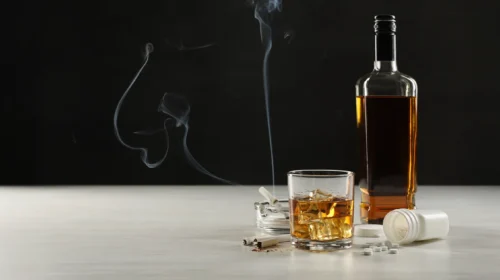Alcohol withdrawal comes with a host of physical and psychological symptoms. These range from mild to moderate to severe to potentially life-threatening, depending on the scope and severity of your alcohol abuse and addiction. There are certain medications for alcohol withdrawal that may help to minimize or partially relieve symptoms; however, it’s important that you consult your doctor before taking any kind of medication during the acute withdrawal period. It’s also important to realize that medications should be taken as part of a comprehensive medical detox and treatment program and are not a substitute for any other element of care, like rehab and counseling.
Common Alcohol Withdrawal Symptoms
Before discussing different medications for alcohol withdrawal, it’s good to understand the different types of physical and psychological symptoms that you or your loved one may experience during acute and protracted withdrawal periods. Alcohol withdrawal symptoms can manifest as early as two to four hours after the last drink and generally reach their peak within 24-48 hours; however, they can last for longer, depending on your level of dependency. Each person’s course of alcohol withdrawal will be different; however, some of the common symptoms include:
Mild to Moderate Alcohol Withdrawal Symptoms
- Insomnia and Sleep Disorder
- Irritability, Anxiety, and Aggression
- Headache/Migraine
- Sensitivity to Light and Sound
- Nausea, Vomiting and Diarrhea
- Fatigue and Disorientation
- Muscle and Joint Pain
- Paranoia and Anxiety
More severe withdrawal symptoms that may require medical attention include:
- Seizures – While serious seizures during alcohol withdrawal are very rare, they can lead to the need for hospitalization and ultimately be fatal. Mild seizures generally occur 6 to 48 hours after the last drink and are caused by the overexcitement of the central nervous system. Around 25-30 percent of those going through serious alcohol experience at least mild seizures.
- Alcohol Hallucinosis – Data indicates as much as 25 percent of individuals with a prolonged history of alcohol abuse have alcoholic hallucinosis. Alcoholic hallucinosis typically begins 12 to 24 hours after the last drink and can last for days to weeks. Symptoms include auditory hallucinations, emotional disturbances, visual delusions, and other distressing effects that can impact behavior and neurobiological health. In some cases, alcohol hallucinosis symptoms can mirror those of schizophrenia.
- Delirium Tremens – Also known as “DTs”, delirium tremens is one of the most intense and dangerous symptoms of alcohol withdrawal. It generally occurs two to three days after your or your loved one’s last drink and can include all of the aforementioned symptoms of alcohol withdrawal, as well as derangement and severe seizure.
Other severe symptoms of alcohol withdrawal that may require medical care include hyperactivity, tremulousness, tachycardia, tachypnea, hyperthermia, and diaphoresis. These symptoms are best managed with the help and guidance of an experienced and qualified team of doctors and nurses. If you or your loved one are experiencing severe alcohol withdrawal symptoms, medical detox can not only mean the difference between prolonged recovery and relapse; it can also very well mean the difference between life and death. Medical detox for alcohol withdrawal offers a safe, discreet, and secure environment and continuous monitoring of symptoms from trained medical staff. It may also include medications for alcohol withdrawal.
What Medications Can Be Used to Treat Alcohol Withdrawal?
The types of medications used to treat your alcohol withdrawal will vary based on your specific symptoms. In many cases, they may be limited to over-the-counter options, like ibuprofen or acetaminophen for mild to moderate pain; stomach meds like Pepto-Bismol® for intestinal distress; or non-prescription or natural sleep aids to help with insomnia. For more severe alcohol withdrawal symptoms, however, some of the following prescription medications may be more effective:
Benzodiazepines (Benzos) for Alcohol Withdrawal
Benzos are commonly used to treat severe alcohol withdrawal syndrome because they counteract the overactivity of the central nervous system. They can also help to reduce the risk of alcoholic seizures. Some of the more common types of benzos used to treat alcohol withdrawal include diazepam (Valium®) and chlordiazepoxide (Librium®), oxazepam (Serax®), and clorazepate (Tranxene®). These medications are the only benzos that have been approved by the Food and Drug Administration (FDA) to treat acute alcohol withdrawal.
Slower-acting benzos are generally considered safer than their fast-acting counterparts because they pose less of a risk of seizures. Benzodiazepines can be highly addictive, and they are not to be taken without a prescription from an experienced and trained physician. Talk to your doctor immediately if you experience any side effects from benzo use.
Anticonvulsants to Treat Alcohol Withdrawal Symptoms
Anticonvulsants (anti-seizure meds) may sometimes be prescribed to those prone to serious and frequent seizures. These medications often include carbamazepine (Tegretol®), Gabapentin (Neurontin®), Oxcarbazepine (Trileptal®), and valproic acid (Depakene®) and may be prescribed on their own or alongside benzos, depending upon how bad your seizures get. While they’re less effective against delirium tremens, anticonvulsants have a much lower potential for abuse than benzos or barbiturates, another commonly prescribed class of drug for alcohol withdrawal.
MAT and Alcohol: Is It Right for Me?
Beyond medications for acute alcohol withdrawal, there are multiple FDA-approved pharmacological interventions for the treatment of alcohol dependency. Though medication-assisted treatment (MAT) is a common mode of care for opioid use disorder, it can also be used to treat long-term alcohol cravings and withdrawal symptoms. Specific MAT drugs for alcohol dependency may include:
- Vivitrol® – Vivitrol (monthly injectable naltrexone) was approved for the treatment of alcohol dependency in 2006 and helps to curtail cravings that lead to relapse. It’s also approved for the treatment of opioid dependency.
- Antabuse® – Antabuse (disulfiram) decreases the body’s ability to properly metabolize alcohol, creating unpleasant or sickening effects when it’s consumed, often resulting in expulsion through vomiting. These immediate negative effects are meant to discourage you from drinking even small amounts of alcohol for total abstinence.
Campral® (acamprosate) works by restoring and rebalancing your brain chemistry and central nervous system function but is less effective in preventing withdrawal symptoms than the two previously mentioned medications.
MAT for alcohol dependency should occur as part of a comprehensive care plan that includes rehab and counseling. Medications alone will not be adequate to treat alcohol withdrawal or addiction.
Dangers of Alcohol Withdrawal Medications
While they may be effective for some people, medications may not be recommended for your specific alcohol withdrawal case. There are many factors to consider, including the potential for dependency and abuse, long-term side effects, underlying health issues that can lead to unwanted reactions, and many more. It’s imperative that you talk to your doctor before taking any prescription medications. They will conduct a full medical history and physical evaluation as part of your withdrawal treatment and let you know if these drugs are an option for you.
Recovery Unplugged offers medically assisted alcohol detox at our facilities in Lake Worth, FL; Austin, TX and Nashville, TN. You or your loved one can get help for your withdrawal symptoms from trained doctors, nurses, and compassionate support staff in a comfortable, discreet, and safe environment. We accept most major insurances and also provide behavioral rehab to help you address the root causes and behavioral triggers associated with your alcohol use disorder. Don’t spend another second battling alcohol addiction on your own. Contact the Recovery Unplugged admissions team to start your treatment today. Our representatives are standing by 24-7 to help you or your loved one.

























